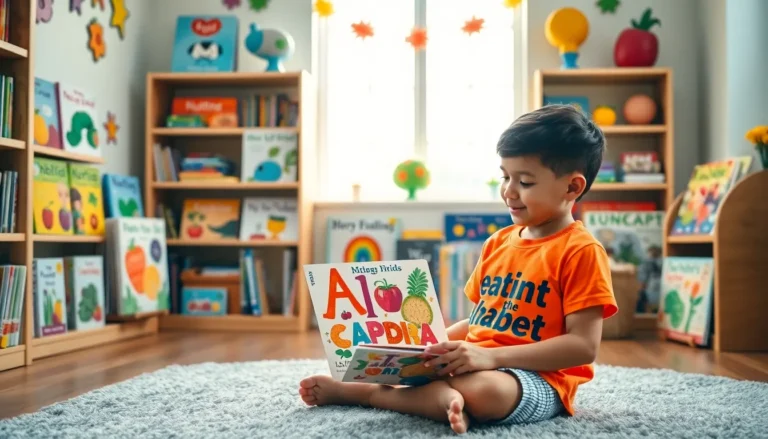Table of Contents
ToggleRoblox, the digital playground where imagination knows no bounds, has taken the gaming world by storm. But have you ever wondered where this phenomenon began? Spoiler alert: it wasn’t in a galaxy far, far away. Instead, it all started in a small office in the tech-savvy city of San Mateo, California.
Overview of Roblox
Roblox stands as a pioneer in the gaming platform industry, offering users a unique environment to create and share games. Founded in 2004, it emerged from the vision of its creators, David Baszucki and Erik Cassel. Their goal focused on crafting an immersive experience where players could not only play but also develop their games.
Initially, the platform operated under the name DynaBlocks. In 2005, it rebranded to Roblox, a fusion of “robots” and “blocks,” reflecting its multi-dimensional game-building concept. Launched to the public in 2006, this platform quickly gained traction, boasting millions of user-generated games by 2020.
San Mateo, California, served as the birthplace of Roblox, where the founders put ideas into practice. In that small office, minimal resources translated into a robust framework that encourages creativity. Players can utilize the Roblox Studio toolkit, giving them complete control over their gaming experiences.
Significant growth followed, with a reported 200 million monthly active users in 2021. A strong community emerged, contributing to a vast library of user-generated content. The platform has maintained a focus on safety, implementing critical features to protect its younger demographic, including chat filters and parental controls.
Investments in technology resulted in constant platform enhancements, making game development accessible. Support for various devices, including mobile phones and consoles, expanded its reach. Developers reap benefits as well, with the possibility to monetize games through in-game purchases, enriching the overall ecosystem of Roblox.
History of Roblox
Roblox’s journey in the gaming world began with humble roots in 2004. The platform, initially named DynaBlocks, emerged from an office in San Mateo, California. Following its rebranding to Roblox in 2005, it showcased a unique approach to game creation. Public launch occurred in 2006, and by 2020, millions of games filled its library. Significant user growth led to 200 million active users by 2021, marking Roblox as a significant player in the gaming industry.
Founding Year
Roblox was officially founded in 2004, a pivotal year that set the stage for its future success. The early development phase focused on creating a versatile gaming platform. As years progressed, the launch of the fully realized platform took place in 2006. Rapid growth followed, attracting a broad audience captivated by user-generated content. The innovative approach to game building resonated with millions, establishing Roblox’s reputation as a leading platform in digital creativity.
Founders of Roblox
David Baszucki and Erik Cassel co-founded Roblox, blending their expertise in technology and gaming. Their vision centered on creating an interactive platform for users to develop their own games. Baszucki played a key role in shaping Roblox’s structure and philosophy, while Cassel contributed significantly to its early development. Together, they laid the groundwork for a vibrant community that celebrated creativity and collaboration. Their combined efforts fostered an environment where developers and players thrived, ensuring Roblox’s enduring success in the gaming landscape.
The Origin Story
Roblox emerged from a simple concept in a small office in San Mateo, California in 2004. Initially named DynaBlocks, the platform underwent a rebranding in 2005 to emphasize its unique game-building capabilities.
Early Development and Challenges
Challenges confronted the team during development. Inadequate funding posed a significant hurdle, compelling the founders, David Baszucki and Erik Cassel, to seek investors. Technical issues also arose, necessitating innovative solutions to create a seamless user experience. Developing a comprehensive platform required robust programming and design skills to address the difficulties faced. Overcoming these obstacles proved crucial in shaping Roblox into a viable gaming environment.
The Initial Release
The public launch occurred in 2006, marking a significant milestone for Roblox. Users could finally access the platform, exploring its creative potential. Early adopters contributed immensely, generating user-generated games that attracted attention. Positive reception from the gaming community fueled rapid growth. By 2020, millions of games had emerged, captivating users worldwide. The launch solidified Roblox as a key player in the gaming industry.
Roblox’s Growth and Expansion
Roblox experienced significant growth and expansion since its public launch in 2006. User-generated content propelled the platform, allowing players to create and share diverse games. In 2020, millions of games emerged, showcasing the creativity of its developers. By 2021, Roblox boasted 200 million monthly active users, solidifying its position in the gaming industry.
The platform’s focus on safety remained paramount as it introduced features like chat filters and parental controls. Developers gained access to a wide range of tools for creating games across multiple devices. Continuous technological investments enhanced the user experience and made game development more accessible.
Revenue generation gained traction through in-game purchases, benefiting both developers and Roblox. Community engagement fostered a culture of collaboration, encouraging users to build on each other’s ideas. This interactive environment amplified creativity, making Roblox a vibrant ecosystem for aspiring game creators.
Supporting its users, Roblox maintained forums and resources for developers, facilitating knowledge sharing and innovation. The company also fostered partnerships with renowned brands, expanding its reach and introducing unique content. As a result, Roblox established itself not only as a game platform but also as a cultural phenomenon.
Impact on Gaming and Culture
Roblox revolutionized gaming by providing a platform where users can create and share their games. Community-driven content transformed the landscape, allowing players to explore millions of user-generated games. Cultural influencers and creators have embraced the platform, expanding its reach beyond traditional gaming audiences.
The platform supported educational initiatives, promoting coding and game design skills among its younger users. By 2020, Roblox inspired developers to generate millions of unique games, emphasizing collaboration and creativity. Notably, it has become a space where friendships and communities thrive, fostering a sense of belonging among players.
Safety measures remain a top priority, ensuring a secure environment for children. Features like chat filters and parental controls contribute to a protected space, which builds trust among parents. Players feel confident engaging with others, knowing their experiences are safeguarded.
Roblox’s partnerships with major brands further establish its impact on culture. Collaborations with popular franchises create immersive experiences, attracting diverse audiences. By uniting gaming and mainstream media, Roblox emerges as a cultural phenomenon.
Sustained revenue growth from in-game purchases benefits both developers and the platform itself. Developers monetize their creations, fostering an entrepreneurial spirit within the community. Continuous investment in technology enhances accessibility, allowing users to design and play games seamlessly across devices.
The vibrant ecosystem nurtures innovation and knowledge sharing. Forums and resources provided by Roblox empower users to improve their skills and share insights. This supportive atmosphere emphasizes creativity and collaboration, solidifying Roblox’s position in the gaming industry and beyond.
Roblox’s journey from a small office in San Mateo to a global gaming phenomenon showcases its remarkable evolution. Founded by visionaries David Baszucki and Erik Cassel, the platform has not only transformed the gaming landscape but also fostered a vibrant community of creators and players. Its commitment to safety and continuous technological advancements ensures a secure and engaging environment for users of all ages. With millions of user-generated games and a thriving ecosystem, Roblox continues to inspire creativity and collaboration, solidifying its status as a leader in the gaming industry.







